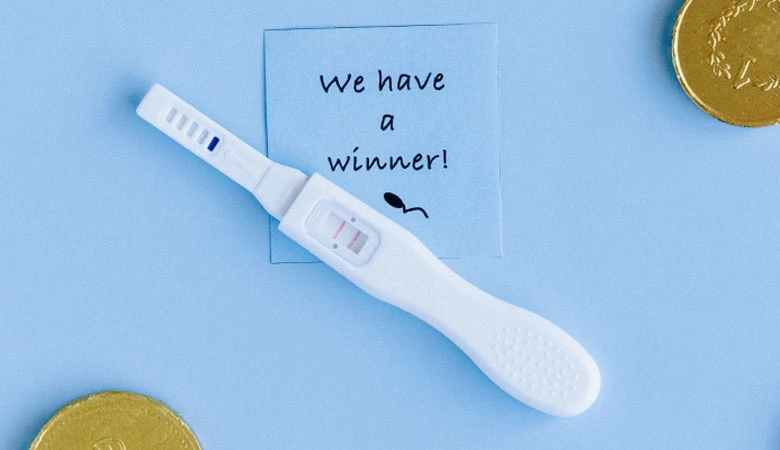Seven Early Signs of Pregnancy
- Early Signs of Pregnancy
-
- UPDATED APRIL 04, 2024

by Tasha Mayberry
430 shares
If you’re reading this, you most likely already suspect that you’re pregnant – or may already know you are but need further confirmation. Either way, the most accurate way of confirming you are pregnant is by doing a pregnancy test at home or through your healthcare provider.
Other than tests, there are some telltale signs of pregnancy. However, the presence of one or more of these signs shouldn’t be read as confirmatory signs. We cannot stress how important it is always to seek the advice of your healthcare provider when it comes to matters relating to your health.

So what are the early signs of pregnancy?
Here are some common signs to suggest early pregnancy.
1. Missed period.
If your menstrual periods are regular and you fall within the childbearing age, a missed is often the first sign that leads you to suspect you may be pregnant. However, one shouldn’t rely on this sign too much, especially when you usually have irregular periods anyway.
On another note, even women with regular menstrual cycles can miss their periods due to some factors, such as stress, travel, or lifestyle, other health and lifestyle factors.
According to the NHS, sudden weight loss, being overweight, oral contraceptive pills, or too much exercise can also lead to missed periods.
On the other hand, some women may also bleed when the fertilised egg embeds itself into the womb. This is easily mistaken as menstrual blood and often happens around the time your period is due. For these reasons, the lack or presence of periods can be misleading rather than confirmatory.
2. Feeling and being sick.
Another common sign associated with pregnancy is nausea and vomiting. This is more pronounced in the morning, which is why it is commonly known as morning sickness. However, it can come at any time of the day or night.
Again, this is not a definite sign. Some complete the entire pregnancy without any of these symptoms at all. For women who do get it, nausea and vomiting usually kick in around the 4 to 6-week pregnant mark, says the NHS.
If your nausea and vomiting are severe enough to knock you over and not keep anything down, it is always best to see your GP for appropriate management.
3. Feeling unusually tired, exhausted, or sleepy most of the time.

These feelings, including mood swings and getting emotional, are all because of the hormonal changes happening within your body during pregnancy. These symptoms are more pronounced during the first 12 weeks of pregnancy.
If you feel like you can’t cope with the excessive tiredness or emotional distress, again, it is always best to consult your healthcare provider for advice.
4. Sore breasts.
This sign can be confusing as some women have tender breasts anyway around the time of their menstrual cycles. During pregnancy, however, you may also feel a bit of tingling on the nipples. Some women also notice that the veins on their breast become more visible, and their nipples can also darken and erect most times.
5. Increased visits to the loo.

If you frequent the loo more often than usual, this may be an early sign of early pregnancy. Watch out for other symptoms; however, as peeing frequently can also mean a lot of underlying problems or a cause of medication.
Medical experts from WebMD note that frequent urination can be attributed to diabetes, and kidney or neurologic problems. They say it can even be a side effect of blood pressure medications. Frequent urination can also be a sign of a urinary tract infection, primarily if this is associated with fever, nausea, or vomiting.
When someone is pregnant, their uterus continuously grows in size and subsequently putting pressure on the bladder. This added pressure is responsible for pregnant women going to the loo more often than usual.
6. Cravings and aversions to specific tastes and odours.
Do you find yourself strangely craving foods you’ve either never had or usually don’t like? Or maybe you’ve noticed yourself hating a specific smell that you used to tolerate or even love. You may also suddenly hate your favourite takeaway dish.
All of these can suggest that you may be pregnant, and again, your body’s changing hormone levels are to blame. If you do end up with cravings or aversions, this will usually be super early and reach its peak on the second trimester. But then again, it can begin and end at any point during your pregnancy.
7. Other signs.

Other early signs of pregnancy as listed by the Mayo Clinic include:
- Bloating. This is another one brought about by hormonal changes.
- Cramping. Some women describe this as similar to the cramps they experience during menstruation.
- Constipation. Hormones can also cause your digestive systems to become sluggish, which results in you being constipated.
- Nasal congestion. Yup, you guessed it. Hormones again. This time, increased hormone levels result in swelling or drying out of your mucous membranes. This change then leads to you’re a stuffed or runny nose.
I have a lot of these symptoms, but my home pregnancy test says negative.
Experts from the NHS emphasise that a positive home pregnancy test is more reliable than a negative result. They advise that you wait a week from your last negative test and then do another check.
My pregnancy test says positive, and I have most of these signs. Do I still see my GP?
YES, because you need special care, monitoring, and advise (especially if you’re a first-time mum) during your pregnancy and delivery.
NO, because you don’t necessarily need to see a GP. In the UK, both doctors and midwives are authorised to provide antenatal care. So if you prefer not to see your GP for your prenatal care, you can always see a midwife.
The important thing is you see an authorised healthcare professional for your antenatal care.
Head on this NHS page to find a list of available maternity services in your area.
We hope you found the answers to the question or questions that led you to our blog post. Remember, if, in doubt, the best thing to do is always to consult your healthcare provider.